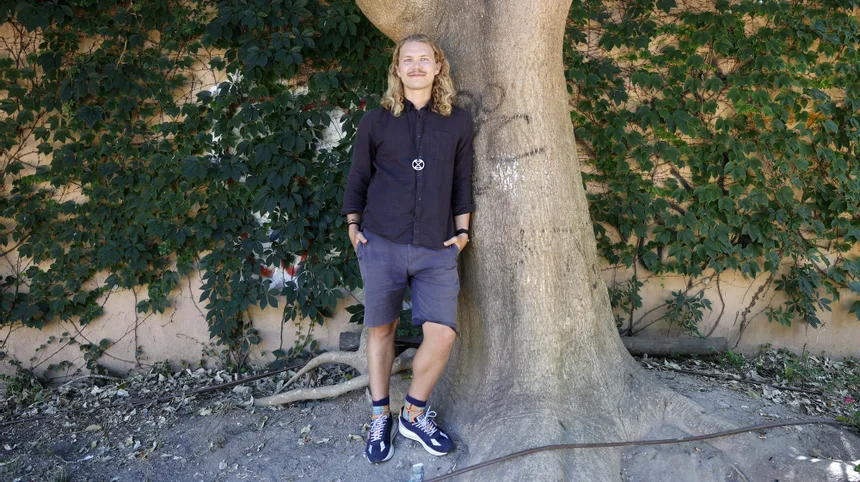The Portuguese Rebellion

Whilst I recover from Long Covid, I've decided to continue the language studies I dropped in 2018 to help found Extinction Rebellion. Languages are my joy. They bring me ever closer to the richness of the human experience. Now I'm on a mission to mix pleasure with passion and use that fondness for language to help coordinate a global rebellion.
In Lisbon I’ve helped revive XR Portugal with a series of talks, training and demonstrations. I was recently interviewed by Lusa News, the national press agency, for a selection of articles about why the movement’s revival was so important. It was my first ever interview in Portuguese and my stomach was filled with butterflies. I’ve translated one of the resulting articles by the right-wing online newspaper, O Observador, into this blog post. Let me know how I got on!
Co-founder of Extinction Rebellion: Portugal is still not reducing enough emissions
Because "people are unaware of the gravity of the environmental situation", 'Extinction Rebellion' will "organise a declaration of rebellion in Portugal" in September, alongside action in the UK and Germany.
The co-founder of environmental action movement "Extinction Rebellion", Robin Boardman, considered this Thursday that "no country" is yet on track to fight climate change, stressing that Portugal is also not reducing emissions enough.
"For example, in Portugal we have the gas in Sines and other gas sources, so it's not reducing (emissions) enough. The science is clear. We need to reduce at least half of (gas) emissions by 2030 and Portugal is not on track, but it's better than the UK," noted the British activist who is in Portugal to take part this Thursday and July 13 in talks at the Goethe-Institut in Lisbon.
For Robin Boardman change must be made "with a movement of the people and not just [with] Government policy. We need a national movement to foster this mindset for a new world.”
Robin Boardman stressed that he wants to bring the UK movement together with that of Portugal, recalling the 650 year old alliance between the two countries, the oldest in the world.
"We need this alliance in the fight against the climate crisis. To share tactics, to share emotions. I am learning a bit more about the situation here (in Portugal) and I will share this information with my colleagues in the UK to join the movement, to create this action," he noted.
The climate activist further criticised some politicians, saying they "are not telling the truth about the climate crisis".
"They are not telling the truth because they do not want to lose votes through unpopular policies and so we have this problem of slow action and people are unaware of the gravity of the situation," he said.
Demanding a change of mentality, Boardman told Lusa that the 'Extinction Rebellion' will "organise a declaration of rebellion in Portugal" in September.
"Every month up to September, we will have an action to mobilise people and raise awareness in Portugal, with dead mermaids, for example, and other creative actions," he stressed.
The activist stresses that the population has to reduce pollutant emissions and adapt to climate change, which he considered to be already irreversible.
"I read the science every day. I feel in my heart the weight that we cannot change and completely reverse this [climate change]. We will suffer - and we are suffering now - from forest fires, from the heat in Texas [United States] and in other parts of the world. It is killing people," he said.
The human species, faced with the situation, will have to reduce emissions of polluting gases, protect biodiversity and adapt, said the rebel, as he calls himself.
"We cannot reverse this, but we can do two things: one is to reduce emissions and protect biodiversity (...) and the second is to adapt to the problems we have now", he indicated, maintaining that we "can reduce the heat in the future and each degree that is reduced" will protect generations from danger.
The activist from the decentralised and non-partisan international movement that uses non-violent direct action to pressure governments explained that society should also focus more on renewable energy and on dyke systems along the coasts to protect people from rising sea levels.
"[We must] create the movement, reduce emissions, adopt policies and adapt as a community to this collapse of society, of the ecological world," he stressed.
After 'Extinction Rebellion' was "hit hard by the pandemic” like many initiatives, Boardman, who is keen to bring the movement back to the international scene, left a message for critics, saying there are "a couple of years to change things" to limit species extinction.
"Critics say we are complaining too much (...), but the science is clear. Everyone can see the science, it's not complicated. The critics usually come from the 'status quo' and are solely focused on profits. That isn’t useful for us. We need life on the planet and that is more important than profits," he stressed.

World Youth Day (WYD) may be opportunity to generate climate-conscious society
On the other hand, Robin Boardman argued that the World Youth Day (WYD), which will take place in Lisbon in August, can be an opportunity to generate a society concerned about climate change.
"I think Pope [Francis] says some good things about climate change and for me it is very important that all religions come together in this crisis. In the UK we have Muslim and Christian groups. I want that also in Portugal", said the activist in an interview to Lusa news agency.
"Right now, we don't have any actions planned but [WYD] could be a good opportunity to create a community of Christians who care about the issue," he said.
Referring to WYD - a meeting of young people from around the world with Pope Francis, which will take place in the first week of August - Robin Boardman said the Pope could influence people to "create a more environmentalist vision".
'Extinction Rebellion' is a global environmental movement that uses non-violent civil disobedience to try to stop the mass extinction of species and minimise the collapse of society. Its elements have organised initiatives such as sitting around private planes, while others cycle around the aircraft, preventing them from taking off.
The movement emerged in 2018 after British activists gathered in Parliament Square in London to announce a declaration of rebellion against the UK government.
In Portugal, although they do not claim to be fans of this movement, students mobilised in protest for the climate and the end of fossil fuels at the end of last year and occupied several schools and universities for a week, a protest which they repeated in other places, such as the Ministry of Economy, and which sometimes forced the intervention of the security forces.
In May, a group of activists from the Stop Gas Platform chained themselves at the main entrance gate of the Liquefied Natural Gas Terminal in the Port of Sines (Setúbal) to block the operation of that infrastructure.
Thanks for reading! If you liked this article, please consider subscribing and sharing to support my work.